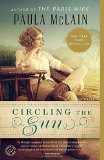Summary | Excerpt | Reading Guide | Discuss | Reviews | Beyond the Book | Readalikes | Genres & Themes | Author Bio

A Novel
by Paula McLainExcerpt
Circling the Sun
Before Kenya was Kenya, when it was millions of years old and yet still somehow new, the name belonged only to our most magnificent mountain. You could see it from our farm in Njoro, in the British East African Protectorate—hard edged at the far end of a stretching golden plain, its crown glazed with ice that never completely melted. Behind us, the Mau Forest was blue with strings of mist. Before us, the Rongai Valley sloped down and away, bordered on one side by the strange, high Menengai Crater, which the natives called the Mountain of God, and on the other by the distant Aberdare Range, rounded blue-grey hills that went smoky and purple at dusk before dissolving into the night sky.
When we first arrived, in 1904, the farm wasn't anything but fifteen hundred acres of untouched bush and three weather-beaten huts.
"This?" my mother said, the air around her humming and shimmering as if it were alive. "You sold everything for this?"
"Other farmers are making a go of it in tougher places, Clara," my father said.
"You're not a farmer, Charles!" she spat before bursting into tears.
He was a horseman, in fact. What he knew was steeplechasing and foxhunting and the tame lanes and hedgerows of Rutland. But he'd seen paper flyers hawking cheap imperial land, and an idea had latched on to him that wouldn't let go. We left Westfield House, where I was born, and travelled seven thousand miles, past Tunis and Tripoli and Suez, the waves like great grey mountains swallowing the sky. Then through Kilindini Harbour, in the port of Mombasa, which smelled of sharp spices and drying fish, and onto the snaking train bound for Nairobi, the windows boiling over with red dust. I stared at everything, completely thrilled in a way I hadn't remembered feeling before. Whatever this place was, it was like nothing and nowhere else.
We settled in and worked to make our situation liveable, pushing against the wildness while the wildness pushed back with everything it had. Our land had no visible borders or fences, and our huts lacked proper doors. Silky, banded colobus monkeys climbed through the burlap sacking covering our windows. Plumbing was unheard of. When nature called, you walked out into the night with all the things that wanted to have at you and hung your derrière over a long-drop, whistling to keep your fear away.
Lady and Lord Delamere were our nearest white neighbours, a seven-mile hack through the bush. Their titles didn't save them from sleeping in the typical mud-and-thatch rondavels. Lady D kept a loaded revolver under her pillow and advised my mother to do the same—but she wouldn't. She didn't want to shoot snakes or her dinner. She didn't want to drag water for miles to have anything like a decent bath, or to live without company for months at a time. There was no society. There was no way to keep her hands clean. Life was simply too hard.
After two years, my mother booked a passage back to England. My older brother, Dickie, would go too, since he had always been frail and wouldn't weather Africa for very much longer. I had yet to turn five when they climbed aboard the twice-weekly train to Nairobi with steamer trunks and handkerchiefs and travelling shoes.
The white feather in my mother's helmet trembled as she kissed me, telling me I should keep my chin up. She knew I'd be fine, since I was such a big strong girl. As a treat, she would send a box of liquorice allsorts and pear drops from a shop in Piccadilly that I wouldn't have to share with a soul.
I watched the train recede along the still black line of the track, not quite believing she would actually go. Even when the last shuddering car was swallowed up by distant yellow hills, and my father turned to me, ready to go back to the farm and his work; even then I thought the whole thing was a mistake, some terrible misunderstanding that would all get sorted at any moment. Mother and Dickie would disembark at the next station, or turn around at Nairobi and be back the next day. When that didn't happen, I kept waiting all the same, listening for the far-off rumble of the train, one eye on the horizon, my heart on tiptoe.
Excerpted from Circling the Sun by Paula McLain. Copyright © 2015 by Paula McLain. Excerpted by permission of Ballantine Books. All rights reserved. No part of this excerpt may be reproduced or reprinted without permission in writing from the publisher.
Fanaticism consists in redoubling your effort when you have forgotten your aim
Click Here to find out who said this, as well as discovering other famous literary quotes!
Your guide toexceptional books
BookBrowse seeks out and recommends the best in contemporary fiction and nonfiction—books that not only engage and entertain but also deepen our understanding of ourselves and the world around us.